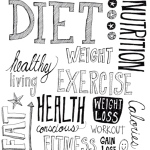Hi all, I lost 1/2 pound this week, so 37 pounds lost in 38 weeks so far, 9-14 pounds still to lose. Feeling good about my progress. The number on the scale doesn’t go down every week, but it does keep going down if I carry on.
My 23-year old son and I are both about the same weight now, but the amount we each eat is wildly different. He’s 5’7″ and 125 pounds, BMI 19.6 (he’s a former preemie with GI problems who has had difficulty gaining weight since infancy, was on supplemental tube feedings for most of his childhood and early adolescence). I’m 57 years old, female, and 119 pounds, BMI 20.4.
At the “lightly active” level (we both probably fit somewhere between light and moderate in terms of how much activity we do), my TDEE is 1526 calories and his is 2091 calories — that’s right, since he’s male, 34 years younger, is 3 inches taller, and weighs 6 more pounds, he needs 525 more calories per day than I do just to maintain his weight — he can eat 37% more than I can and not gain weight! He would like to *gain* a little weight if he could, if he can put it on as muscle, but, no matter how much he does intense upper-body workouts, he just doesn’t build muscle where he wants it, and doesn’t gain weight.
The difference in our caloric intake on our non-fasting days is probably even more than 500 calories, though. We eat about the same amount for dinner except that he’ll have 3 scoops of ice cream for dessert to my 1 scoop. That’s probably at least half of the 500 calories right there.
My breakfast? Oh, say, 150 grams each of low-fat greek yogurt and thawed frozen fruit mixed together plus coffee with half-and-half for maybe 300 calories. His? Maybe a breakfast burrito he makes with bacon, eggs, cheddar cheese, leftover roasted potatoes and hot sauce wrapped in a large flour tortilla, plus the coffee with half-and-half.
My lunch? Oh, say, 35-45 grams of cheese on 3 lavash whole-grain crackers and a large serving of leftover jicama salad or an orange, coming in at 300-400 calories. His lunch? A grilled cheese sandwich and a banana. I guess I should point out that, while he no longer needs the tube feedings, he is still on a prescribed high-fat, calorie-dense diet.
OK, so I’m losing weight right now; since the fast days only cut out about 2000 calories per week for me and I’ve been averaging a pound a week weight loss, the other 1500 calories must come from the increased walking plus a bit of calorie restriction on most non-fasting days, but still.
And I remember being able to eat the way he does (well, OK, maybe not *every* day, but at least some days) at his age and stay at 105-107 pounds… as a matter of fact, if I was still his age, and weighed what I do now, my TDEE would be 1760 calories instead of 1526… yup, if I was just younger, I could eat 200 more calories per day (15% more) and not gain weight.
But somehow all those calories just burn off him… and I remember when the same thing would happen to me… people are just different, one from another, and the passing years change things! So, I remind myself that most of the enjoyment of a food seems to come in the first couple of bites. ‘Cuz I do like good food. Just can’t eat so much of it any more 😉






12:55 pm
10 May 14